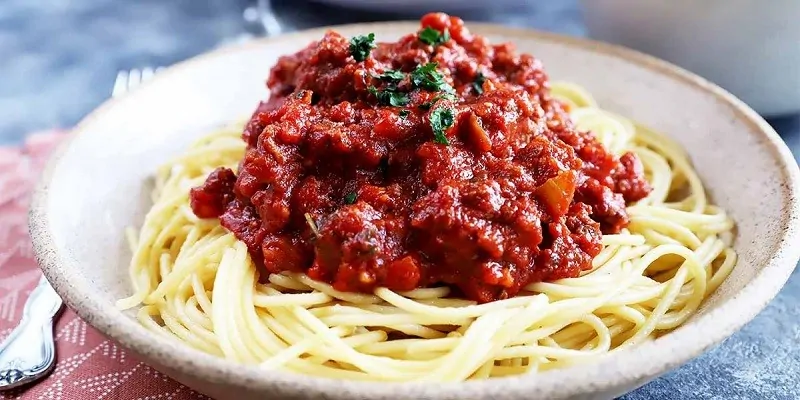Yes, you can eat spaghetti sauce while pregnant as long as it is pasteurized and thoroughly cooked to eliminate any potential bacteria.
Spaghetti sauce, a staple in many households, is a tomato-based sauce commonly used as a topping for pasta dishes. During pregnancy, it’s crucial to be mindful of the foods you consume to ensure the safety and well-being of both you and your growing baby. While spaghetti sauce is generally considered safe, there are certain precautions to take and nutritional considerations to keep in mind.
What is Spaghetti Sauce?
Spaghetti sauce, also known as marinara sauce or pasta sauce, is a flavorful condiment made primarily from tomatoes, herbs, spices, and sometimes meat or vegetables. It can be homemade or store-bought, with a wide range of varieties available, from classic marinara to creamy tomato-based sauces. Spaghetti sauce is a versatile ingredient that can be used in various dishes, including pasta, and pizza, and as a dipping sauce.
Nutritional Value of Spaghetti Sauce
| Nutritional Value | Details |
|---|---|
| Calories | A typical serving (1/2 cup) contains around 70-100 calories. |
| Carbohydrates | Spaghetti sauce is a good source of carbohydrates, providing around 10-15 grams per serving. |
| Fiber | Depending on the ingredients, spaghetti sauce can provide 2-4 grams of fiber per serving. |
| Vitamins | Rich in vitamins A and C, as well as small amounts of B vitamins. |
| Minerals | Contains minerals like potassium, iron, and calcium. |
Risks of Eating Spaghetti Sauce During Pregnancy
| Risks | Details |
|---|---|
| Listeria | Unpasteurized or improperly cooked spaghetti sauce may contain listeria bacteria, which can cause listeriosis, a serious infection during pregnancy. |
| Heartburn | The acidity in tomatoes can trigger or worsen heartburn, a common issue during pregnancy. |
| Allergies | Some spaghetti sauces may contain ingredients like nuts or dairy products, which could cause allergic reactions in some pregnant women. |
| Sodium | Some store-bought spaghetti sauces can be high in sodium, which can contribute to water retention and high blood pressure during pregnancy. |
Safe Ways to Eating Spaghetti Sauce During Pregnancy
To safely enjoy spaghetti sauce during pregnancy, it’s essential to follow proper food handling and preparation guidelines. Always opt for pasteurized spaghetti sauce or ensure that homemade sauces are cooked thoroughly to eliminate any potential bacteria. Additionally, be mindful of portion sizes and choose low-sodium options or make your own sauce to control the salt content.
Alternatives to Spaghetti Sauce During Pregnancy
| Alternatives | Precautions |
|---|---|
| Pesto Sauce | Avoid if made with unpasteurized cheese or raw eggs. |
| Alfredo Sauce | High in fat and calories, so consume in moderation. |
| Olive Oil and Garlic | A simple and healthy option, but lacks the flavor complexity of spaghetti sauce. |
| Vegetable-based Sauces | Ensure proper cooking and handling to avoid foodborne illnesses. |
Experts Tips
- “Pregnant women should avoid unpasteurized or raw spaghetti sauce, as it may contain harmful bacteria like listeria. Always opt for pasteurized or thoroughly cooked sauces.”
- “Homemade spaghetti sauce can be a nutritious option during pregnancy, as you can control the ingredients and sodium content.”
- “If you experience heartburn or acid reflux after consuming spaghetti sauce, try adding a dollop of plain yogurt or milk to help neutralize the acidity.”
FAQs
Can I eat spaghetti sauce from a jar while pregnant?
Yes, you can eat spaghetti sauce from a jar while pregnant, but ensure it is pasteurized and properly stored. Always check the label for any potential allergens or ingredients to avoid during pregnancy.
Is it safe to eat cold spaghetti sauce during pregnancy?
It is generally not recommended to consume cold spaghetti sauce during pregnancy, as it may increase the risk of foodborne illnesses. Always heat the sauce thoroughly before consuming it.
Can I eat spaghetti sauce if I have gestational diabetes?
If you have gestational diabetes, it’s best to consult with your healthcare provider or a registered dietitian. Some spaghetti sauces may contain added sugars or have a higher glycemic index, which could affect your blood sugar levels.
Can I eat spaghetti sauce if I have heartburn during pregnancy?
If you experience heartburn or acid reflux during pregnancy, it’s advisable to limit your intake of acidic foods like spaghetti sauce or opt for low-acid varieties. You can also try adding a dollop of plain yogurt or milk to help neutralize the acidity.
Can I eat spaghetti sauce if I have a tomato allergy?
If you have a known allergy or sensitivity to tomatoes, it’s best to avoid spaghetti sauce or choose alternative sauces that do not contain tomatoes.
Conclusion
Spaghetti sauce can be a delicious and nutritious addition to your pregnancy diet, provided you take the necessary precautions. By choosing pasteurized or thoroughly cooked sauces, being mindful of portion sizes, and considering any potential allergies or dietary restrictions, you can safely enjoy this flavorful condiment while nourishing yourself and your growing baby.
Last Updated on May 29, 2024 by Marjorie R. Rogers, MA (English), Certified Consultant

